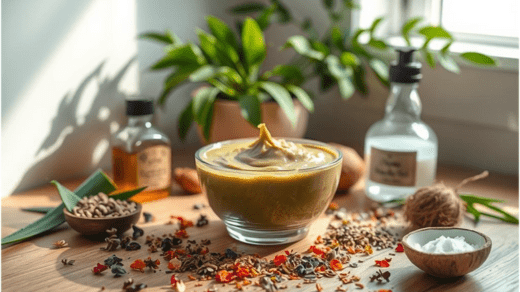Imagine sitting in your favorite coffee shop, sipping on a warm latte, while catching up with friends. As the conversation flows, you notice your friend casually scratching their scalp, their shoulders tense with discomfort. You can’t help but relate; after all, nearly 50% of people experience dandruff at some point. Did you know that stress could make it worse? A recent study found a link between stress and skin issues, leading many to look for natural solutions.
This article will show you 11 effective herbal solutions for dandruff. Whether you need a gentle exfoliant or something to soothe your scalp, natural remedies might be the answer. Get ready to take control of your scalp health with these tried-and-true solutions!
Key Takeaways
- Nearly 50% of the global population will experience dandruff at least once in their lifetime.
- Stress is linked to exacerbating dandruff and other skin conditions.
- Natural remedies for dandruff can effectively soothe and treat the scalp.
- A variety of herbal solutions, from coconut oil to baking soda, can provide relief.
- Choosing the best natural remedies for dandruff involves understanding individual scalp needs.
Understanding Dandruff and Its Causes
Dandruff is a common problem that many people face. It often starts in young adulthood and can last into middle age. Knowing the causes of dandruff is key to managing it.
Dandruff can be either dry scalp or seborrheic dermatitis. Dry scalp causes minor flaking. Seborrheic dermatitis can lead to red, inflamed patches. Symptoms include an itchy scalp and white flakes on clothes.
- Dry skin, especially in cold weather, makes flaking worse.
- Dermatological conditions like psoriasis and eczema can make scalp issues worse.
- An overgrowth of Malassezia yeast, a fungus on the scalp, can cause irritation.
- Hormonal changes, especially in men, can lead to more oil production.
- Stress, especially in colder, dryer months, can make dandruff symptoms worse.
Health conditions like Parkinson’s disease can increase the risk of dandruff. People with weakened immune systems, like those with HIV, are also more at risk. Those with oily skin or a history of skin disorders like acne or rosacea are more likely to get seborrheic dermatitis.
Infants can also get dandruff, known as cradle cap. It shows as scaly patches on their scalp. Males are more likely to get dandruff than females. Keeping the scalp clean through regular shampooing helps prevent and manage it.
In summary, knowing the causes of dandruff, its symptoms, and related scalp conditions is the first step to treating and managing it.
Why Choose Herbal Remedies for Dandruff?
Herbal remedies for dandruff are popular for their effectiveness and safety. They are gentler than chemical products, which can irritate the scalp. Ingredients like tea tree oil and aloe vera fight dandruff and have extra benefits. They have antimicrobial and anti-inflammatory properties.
Scalp issues often come from dryness. This can be due to dehydration, cold air, or harsh cleaners. A study showed that ingredients like probiotics, honey, turmeric, and vitamin B12 can help. They may ease dandruff and keep the scalp healthy.
Coconut oil is great for moisturizing and soothing the scalp. Apple cider vinegar balances the scalp’s pH and kills harmful microbes. Using these herbal remedies regularly can show results in a few weeks.
If you have persistent dandruff, herbal remedies can help. Ingredients like witch hazel, baking soda, and Ayurvedic herbs like Neem are good options. They can help manage dandruff well.
11 Powerful Herbal Solutions for Dandruff Treatment at Home
Dandruff affects about 50% of people. Many look for natural ways to treat it. There are many safe and gentle herbal treatments. These can help make your hair healthy and look good.
- Tea Tree Oil: This oil fights fungi well. Adding a few drops to shampoo can help with dandruff.
- Coconut Oil: It moisturizes and fights fungi. Massaging it into your scalp before washing helps your hair.
- Aloe Vera: It soothes the scalp. Aloe vera reduces irritation and flakes with its anti-inflammatory properties.
- Apple Cider Vinegar: It balances scalp pH. A diluted rinse with water makes it work better.
- Baking Soda: It’s a gentle exfoliant. Baking soda fights dandruff with its antifungal properties.
- Aspirin: It has salicylic acid. Crushed aspirin mixed with shampoo can exfoliate flakes.
- Omega-3 Fatty Acids: They keep skin healthy. Omega-3s reduce inflammation and keep the skin barrier strong.
- Probiotics: They boost the immune system. Probiotics fight fungal infections that cause dandruff.
- Garlic: It fights bacteria and fungi. Garlic in a mask with honey adds extra benefits.
- Lemon Juice: Its acidity keeps scalp pH right. Lemon juice also supports scalp health with its vitamins.
- Olive Oil: It deeply moisturizes. Olive oil helps with a dry scalp.
Using these herbal solutions for dandruff treatment at home, you can greatly improve your scalp health and reduce your dandruff symptoms.
Application Tips for Effective Results
To get the best from herbal remedies, how you apply them matters a lot. Knowing how to use them can make them work better. Here are some tips for treating dandruff effectively:
- Dilution: Mix strong essential oils, like tea tree oil, with a carrier oil. Use coconut or jojoba oil. This makes it safer and less likely to irritate.
- Massage: Rub the treatment into your scalp for 5-10 minutes. This helps it soak in and boosts blood flow, which is good for your scalp.
- Timing: Let coconut and olive oil sit on your scalp for a few hours or overnight. This keeps it moist and nourishes deeper.
- Consistency: Treat your scalp 2-3 times a week. This is how you get lasting results.
- Rinse: Make sure to rinse your scalp well after treatment. This prevents buildup and keeps it moist without irritation.
Try using herbal remedies with medicated shampoos for the best dandruff control. Learning how to apply herbal remedies lets you customize your scalp care.
| Herbal Remedy | Application Method | Benefits |
| Coconut Oil | Massage into scalp and leave for a few hours | Moisturizes and nourishes the scalp |
| Aloe Vera | Apply gel and leave for 30 minutes before washing | Reduces itching and irritation |
| Lemon Juice | Apply directly to the scalp and rinse after 15 minutes | Rich in vitamin C, promotes a healthy scalp |
| Tea Tree Oil | Mix with carrier oil and massage into scalp | Antimicrobial properties help combat dandruff |
Additional Dandruff Management Techniques
Managing dandruff well needs both herbal remedies and lifestyle changes. Adding lifestyle tips for dandruff control can greatly help your scalp’s health. Here are some important techniques to try:
- Diet Modification: Eat foods rich in omega-3 and probiotics to boost scalp health. Stay away from refined carbs and sugar to cut down inflammation.
- Stress Management: Stress can make dandruff worse, so find ways to relax. Yoga, meditation, and exercise can help reduce stress.
- Regular Washing: Keep your scalp clean by washing your hair often with a gentle shampoo. This removes flakes and oil build-up well.
- Avoid Irritants: Pick hair care products without harsh chemicals and fragrances to avoid irritating your scalp.
Adding these methods to your daily life can help you manage dandruff better. Remember, taking care of yourself and making smart choices is key to a healthier, flake-free scalp.
Conclusion
Dandruff can really bother you, affecting how you look and feel. But you can fight it with natural remedies for dandruff. Using herbs like tea tree oil, neem, and coconut oil can really help your scalp.
Adding home remedies to your daily routine is smart. It helps keep your scalp healthy. Also, using Ayurvedic herbs can help control dandruff and make your hair stronger.
Being consistent with these remedies is important. If dandruff lasts for weeks, see a doctor. Making a few changes and using these natural solutions can make your scalp healthier. This will help you feel better and get rid of dandruff.
FAQ
What are the main causes of dandruff?
Dandruff can come from dry skin, seborrheic dermatitis, or skin issues like psoriasis and eczema. It can also be caused by too much Malassezia yeast. Knowing these causes helps you find the right treatment.
Which natural remedies are most effective for treating dandruff at home?
Tea tree oil, coconut oil, and aloe vera are great for dandruff. Apple cider vinegar, baking soda, and lemon juice also work well. They have antifungal and moisturizing properties that soothe the scalp.
How often should I apply herbal remedies for dandruff?
Treat your scalp with herbal remedies 2-3 times a week. This keeps your scalp healthy and fights dandruff well.
Can diet impact dandruff severity?
Yes, what you eat affects your scalp. Omega-3 fatty acids and probiotics help. Avoid refined carbs and sugars to reduce inflammation and improve symptoms.
Are there any side effects from using natural remedies for dandruff?
Natural remedies are usually safer than chemicals. But, some might get irritation or allergies. Always test a small area before using new ingredients.
How can I manage dandruff as a chronic condition?
For chronic dandruff, stick to your remedies and eat well. Manage stress and avoid harsh hair products. Wash your hair gently with a mild shampoo.
Can stress worsen dandruff symptoms?
Yes, stress can make dandruff worse. Try yoga, meditation, or exercise to reduce stress and improve scalp health.
What are the signs that I should see a healthcare provider for dandruff?
See a doctor if dandruff lasts more than a few weeks, gets very itchy or inflamed, or causes hair loss. They can help with further treatment.
For a variety of content focused on natural and herbal remedies for various healthcare concerns, please visit: Pure Remedy Solutions
Tags: dandruff treatment at home, natural remedies for dandruff, Pure Remedy Solutions, best natural remedies for dandruff, best dandruff treatment at home

